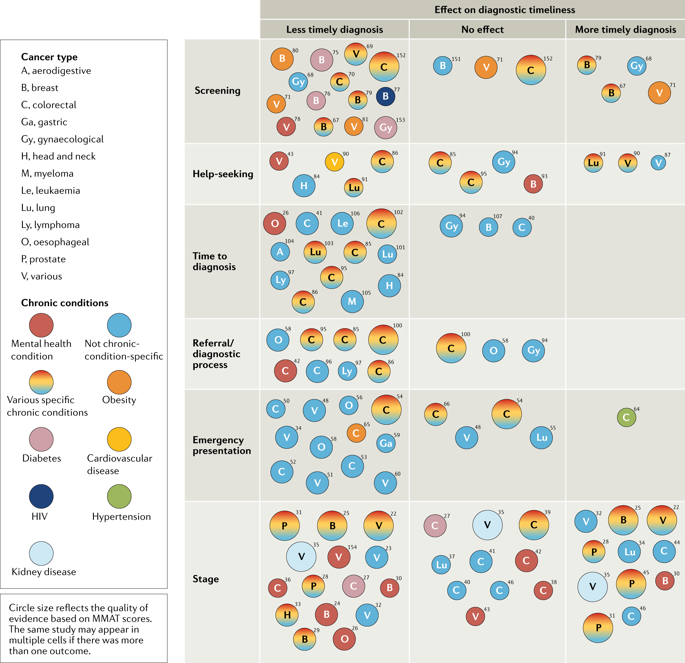当前位置:
X-MOL 学术
›
Nat. Rev. Clin. Oncol.
›
论文详情
Our official English website, www.x-mol.net, welcomes your feedback! (Note: you will need to create a separate account there.)
Comorbid chronic diseases and cancer diagnosis: disease-specific effects and underlying mechanisms.
Nature Reviews Clinical Oncology ( IF 78.8 ) Pub Date : 2019-07-26 , DOI: 10.1038/s41571-019-0249-6 Cristina Renzi 1, 2 , Aradhna Kaushal 1 , Jon Emery 3 , Willie Hamilton 4 , Richard D Neal 5 , Bernard Rachet 2 , Greg Rubin 6 , Hardeep Singh 7 , Fiona M Walter 8 , Niek J de Wit 9 , Georgios Lyratzopoulos 1, 8
Nature Reviews Clinical Oncology ( IF 78.8 ) Pub Date : 2019-07-26 , DOI: 10.1038/s41571-019-0249-6 Cristina Renzi 1, 2 , Aradhna Kaushal 1 , Jon Emery 3 , Willie Hamilton 4 , Richard D Neal 5 , Bernard Rachet 2 , Greg Rubin 6 , Hardeep Singh 7 , Fiona M Walter 8 , Niek J de Wit 9 , Georgios Lyratzopoulos 1, 8
Affiliation

|
An earlier diagnosis is a key strategy for improving the outcomes of patients with cancer. However, achieving this goal can be challenging, particularly for the growing number of people with one or more chronic conditions (comorbidity/multimorbidity) at the time of diagnosis. Pre-existing chronic diseases might affect patient participation in cancer screening, help-seeking for new and/or changing symptoms and clinicians' decision-making on the use of diagnostic investigations. Evidence suggests, for example, that pre-existing pulmonary, cardiovascular, neurological and psychiatric conditions are all associated with a more advanced stage of cancer at diagnosis. By contrast, hypertension and certain gastrointestinal and musculoskeletal conditions might be associated with a more timely diagnosis. In this Review, we propose a comprehensive framework that encompasses the effects of disease-specific, patient-related and health-care-related factors on the diagnosis of cancer in individuals with pre-existing chronic illnesses. Several previously postulated aetiological mechanisms (including alternative explanations, competing demands and surveillance effects) are integrated with newly identified mechanisms, such as false reassurances, or patient concerns about appearing to be a hypochondriac. By considering specific effects of chronic diseases on diagnostic processes and outcomes, tailored early diagnosis initiatives can be developed to improve the outcomes of the large proportion of patients with cancer who have pre-existing chronic conditions.
中文翻译:

共病慢性疾病和癌症诊断:疾病特异性效应和潜在机制。
早期诊断是改善癌症患者预后的关键策略。然而,实现这一目标可能具有挑战性,特别是对于在诊断时患有一种或多种慢性病(合并症/多种疾病)的人越来越多。预先存在的慢性疾病可能会影响患者参与癌症筛查、寻求新的和/或变化的症状的帮助以及临床医生对使用诊断调查的决策。例如,有证据表明,预先存在的肺部、心血管、神经和精神疾病都与诊断时癌症的更晚期阶段有关。相比之下,高血压和某些胃肠道和肌肉骨骼疾病可能与更及时的诊断有关。在这篇评论中,我们提出了一个综合框架,其中包括疾病特异性、患者相关和医疗保健相关因素对已患有慢性疾病的个体癌症诊断的影响。一些先前假设的病因机制(包括替代解释、竞争性需求和监测效果)与新发现的机制相结合,例如虚假的再保证,或患者对看起来是疑病症的担忧。通过考虑慢性病对诊断过程和结果的具体影响,可以制定量身定制的早期诊断计划,以改善大部分已患有慢性病的癌症患者的结果。患者相关和医疗保健相关因素对已患有慢性疾病的个体癌症诊断的影响。一些先前假设的病因机制(包括替代解释、竞争性需求和监测效果)与新发现的机制相结合,例如虚假的再保证,或患者对看起来是疑病症的担忧。通过考虑慢性病对诊断过程和结果的具体影响,可以制定量身定制的早期诊断计划,以改善大部分已患有慢性病的癌症患者的结果。患者相关和医疗保健相关因素对已患有慢性疾病的个体癌症诊断的影响。一些先前假设的病因机制(包括替代解释、竞争性需求和监测效果)与新发现的机制相结合,例如虚假的再保证,或患者对看起来是疑病症的担忧。通过考虑慢性病对诊断过程和结果的具体影响,可以制定量身定制的早期诊断计划,以改善大部分已患有慢性病的癌症患者的结果。竞争性需求和监测效果)与新发现的机制相结合,例如虚假的保证,或患者担心看起来是疑病症。通过考虑慢性病对诊断过程和结果的具体影响,可以制定量身定制的早期诊断计划,以改善大部分已患有慢性病的癌症患者的结果。竞争性需求和监测效果)与新发现的机制相结合,例如虚假的保证,或患者担心看起来是疑病症。通过考虑慢性病对诊断过程和结果的具体影响,可以制定量身定制的早期诊断计划,以改善大部分已患有慢性病的癌症患者的结果。
更新日期:2019-11-18
中文翻译:

共病慢性疾病和癌症诊断:疾病特异性效应和潜在机制。
早期诊断是改善癌症患者预后的关键策略。然而,实现这一目标可能具有挑战性,特别是对于在诊断时患有一种或多种慢性病(合并症/多种疾病)的人越来越多。预先存在的慢性疾病可能会影响患者参与癌症筛查、寻求新的和/或变化的症状的帮助以及临床医生对使用诊断调查的决策。例如,有证据表明,预先存在的肺部、心血管、神经和精神疾病都与诊断时癌症的更晚期阶段有关。相比之下,高血压和某些胃肠道和肌肉骨骼疾病可能与更及时的诊断有关。在这篇评论中,我们提出了一个综合框架,其中包括疾病特异性、患者相关和医疗保健相关因素对已患有慢性疾病的个体癌症诊断的影响。一些先前假设的病因机制(包括替代解释、竞争性需求和监测效果)与新发现的机制相结合,例如虚假的再保证,或患者对看起来是疑病症的担忧。通过考虑慢性病对诊断过程和结果的具体影响,可以制定量身定制的早期诊断计划,以改善大部分已患有慢性病的癌症患者的结果。患者相关和医疗保健相关因素对已患有慢性疾病的个体癌症诊断的影响。一些先前假设的病因机制(包括替代解释、竞争性需求和监测效果)与新发现的机制相结合,例如虚假的再保证,或患者对看起来是疑病症的担忧。通过考虑慢性病对诊断过程和结果的具体影响,可以制定量身定制的早期诊断计划,以改善大部分已患有慢性病的癌症患者的结果。患者相关和医疗保健相关因素对已患有慢性疾病的个体癌症诊断的影响。一些先前假设的病因机制(包括替代解释、竞争性需求和监测效果)与新发现的机制相结合,例如虚假的再保证,或患者对看起来是疑病症的担忧。通过考虑慢性病对诊断过程和结果的具体影响,可以制定量身定制的早期诊断计划,以改善大部分已患有慢性病的癌症患者的结果。竞争性需求和监测效果)与新发现的机制相结合,例如虚假的保证,或患者担心看起来是疑病症。通过考虑慢性病对诊断过程和结果的具体影响,可以制定量身定制的早期诊断计划,以改善大部分已患有慢性病的癌症患者的结果。竞争性需求和监测效果)与新发现的机制相结合,例如虚假的保证,或患者担心看起来是疑病症。通过考虑慢性病对诊断过程和结果的具体影响,可以制定量身定制的早期诊断计划,以改善大部分已患有慢性病的癌症患者的结果。


























 京公网安备 11010802027423号
京公网安备 11010802027423号